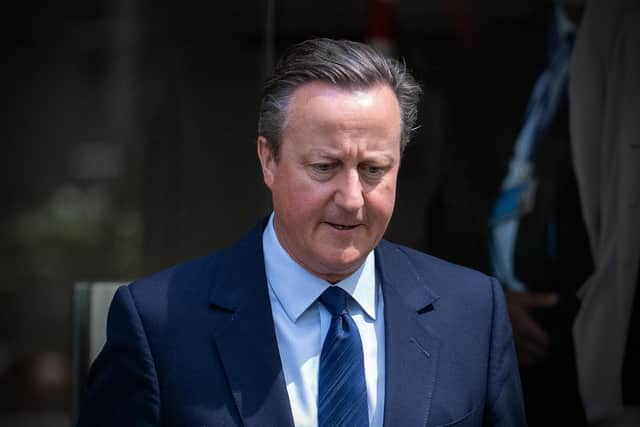David Cameron's return is a tacit admission by Rishi Sunak that the country needs a general election – Scotsman comment
Rishi Sunak’s surprise decision to appoint David Cameron as Foreign Secretary is an affront to the electorate, to democracy, and to the parliamentary Conservative party. That said, the former Prime Minister is likely to do a decent job as the UK’s representative to the rest of the world and the move shows that Sunak is prepared to put country above party and indeed his own interests.
The announcement may have overshadowed Suella Braverman’s sacking as Home Secretary, but it will also dramatically increase the tensions with the MPs who support her open ambitions to lead the party. Cameron called the Brexit referendum but only in the hope of ending the Tories’ bitter divisions over the question by putting the Leave camp in its place. This earned him their lasting enmity, for all the decision backfired with catastrophic consequences for the UK. Sunak was a Brexiteer but appears to be regarded with suspicion by the more hardcore of his fellow travellers on that question and Cameron’s return will only increase their dislike of his generally pragmatic approach to the EU and politics in general.
Advertisement
Hide AdAdvertisement
Hide AdFurthermore, the fact that Sunak looked at the ranks of the Tories’ elected representatives and decided that none of them were up to the job is unlikely to play well, given politicians tend to be more ambitious than most. By going outside the Commons to fill such a high-profile post, Sunak has basically admitted there is a lack of talent within his own MPs.
There is also the question of how Cameron will be held to account as Foreign Secretary from his new position in the House of Lords. Governments are supposed to be subjected to democratic scrutiny, not by those who are effectively appointed to their roles by the government.
However, it must be said Cameron is far from a terrible choice as Foreign Secretary, particularly given the seriousness of current events. His experience on the international stage will help deal with the multiple crises facing the world such as the war in Ukraine, Israel’s war with Hamas, and deteriorating relations with China. He is also likely to mend fences with the EU that were wilfully trashed by Brexiteer ministers.
Sunak had few cards to play with when he inherited the shambolic mess left by Boris Johnson and Liz Truss. This was almost certainly a factor that helped him become Conservative leader, and therefore Prime Minister, without a party vote – no other MP wanted the job. But he has played most of his cards reasonably well and his decision to bring back Cameron was brave and bold, adjectives that some politicians seek to avoid as they calculate their political best interests.
The problems that the appointment raises over the lack of a democratic mandate and sufficient accountability are serious, but they should actually prompt greater thinking about how to enable the retention of political talent after a fall from high office. Indeed, the Conservatives’ descent into their current woes can perhaps be traced back to the point at which the influence of party elders from the Thatcher era like Ken Clarke began to wane. Some will argue the House of Lords provides a valuable route back, but there needs to be a democratic way.


However, ultimately, the electorate will have their say. And, in accepting his party has a talent problem, Sunak has tacitly made the case for a general election to be held sooner, rather than later. The UK urgently needs a fresh crop of elected politicians full of ideas, energy and passion to change the country for the better.
Comments
Want to join the conversation? Please or to comment on this article.
